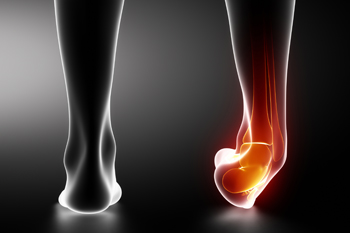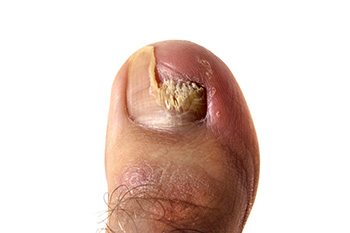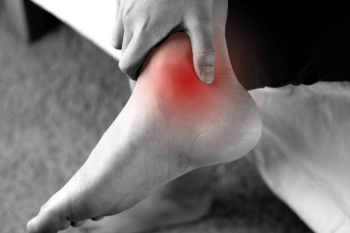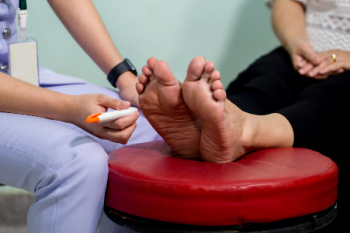Connect With Us
Blog
Items filtered by date: October 2024
Recovery From a Broken Ankle

Ankle fractures can severely impact both physical mobility and psychological well-being, disrupting daily life and causing significant emotional stress. These injuries often limit a person’s independence, leading to frustration and feelings of helplessness. The pain and discomfort associated with fractures frequently interfere with sleep, causing fatigue and irritability, which can further slow the recovery process. Podiatrists diagnose ankle fractures through physical exams and imaging, such as X-rays or CT scans, and create a tailored treatment plan. This may include casting, splinting, or surgery, depending on the fracture's severity. Key factors in recovery involve keeping weight off the injured ankle, following podiatrist instructions, and monitoring for signs of infection or improper healing. Early intervention and compliance with medical advice help reduce the risk of chronic ankle pain, instability, or arthritis. If you have broken your ankle, it is strongly suggested that you promptly visit a podiatrist.
Broken ankles need immediate treatment. If you are seeking treatment, contact Zina Cappiello, DPM from Dr. Zina B. Cappiello DPM, LLC. Our podiatrist can provide the care you need to keep you pain-free and on your feet.
Broken Ankles
A broken ankle is experienced when a person fractures their tibia or fibula in the lower leg and ankle area. Both of these bones are attached at the bottom of the leg and combine to form what we know to be our ankle.
When a physician is referring to a break of the ankle, he or she is usually referring to a break in the area where the tibia and fibula are joined to create our ankle joint. Ankles are more prone to fractures because the ankle is an area that suffers a lot of pressure and stress. There are some obvious signs when a person experiences a fractured ankle, and the following symptoms may be present.
Symptoms of a Fractured Ankle
- Excessive pain when the area is touched or when any pressure is placed on the ankle
- Swelling around the area
- Bruising of the area
- Area appears to be deformed
If you suspect an ankle fracture, it is recommended to seek treatment as soon as possible. The sooner you have your podiatrist diagnose the fracture, the quicker you’ll be on the way towards recovery.
If you have any questions, please feel free to contact our office located in Clifton, NJ . We offer the newest diagnostic and treatment technologies for all your foot care needs.
Understanding Acute Ankle Sprains

An acute ankle sprain occurs when the ligaments that support the ankle are stretched or torn, often due to a sudden twist, turn, or impact. This injury is common among athletes, but can happen to anyone during everyday activities. Symptoms typically include immediate pain, swelling, bruising, and difficulty bearing weight on the affected foot. The impact of an ankle sprain can vary in severity, from mild stretching to complete tears, and recovery times can differ significantly. If left untreated, an ankle sprain can lead to chronic instability and recurring injuries, affecting overall mobility. To ensure proper healing and to regain strength, it is key to seek professional advice. If you suspect an acute ankle sprain, it is suggested you schedule an appointment with a podiatrist. They can provide a thorough evaluation, recommend an effective treatment plan, and guide you on rehabilitation to get you back on your feet safely.
Although ankle sprains are common, they aren’t always minor injuries. If you need your ankle injury looked at, contact Zina Cappiello, DPM from Dr. Zina B. Cappiello DPM, LLC. Our podiatrist can provide the care you need to keep you pain-free and on your feet.
How Does an Ankle Sprain Occur?
Ankle sprains are the result of a tear in the ligaments within the ankle. These injuries may happen when you make a rapid shifting movement while your foot is planted. A less common way to sprain your ankle is when your ankle rolls inward while your foot turns outward.
What Are the Symptoms?
- Pain at the sight of the tear
- Bruising/Swelling
- Ankle area is tender to touch
- In severe cases, may hear/feel something tear
- Skin discoloration
Preventing a Sprain
- Wearing appropriate shoes for the occasion
- Stretching before exercises and sports
- Knowing your limits
Treatment of a Sprain
In many cases, the RICE method (Rest, Ice, Compression, and Elevate) is used to treat ankle sprains. However, you should see a podiatrist to see which treatment option would work best with your injury. In severe cases, surgery may be required.
It is important to ask your doctor about rehab options after you receive treatment for your injury. Stretching, strength training, and balance exercises may help the ankle heal while also preventing further injury.
If you have any questions, please feel free to contact our office located in Clifton, NJ . We offer the newest diagnostic and treatment technologies for all your foot care needs.
Understanding Toenail Fungus Infections

Onychomycosis is a fungal infection that affects the toenails, often leading to brittle, discolored, and thickened nails. Common symptoms include yellow or white streaks under the nail, a distorted nail shape, and, in severe cases, pain or discomfort. This infection can also cause nails to crumble or separate from the nail bed, making it not only unsightly but also potentially painful. Effective treatments for onychomycosis vary depending on the severity of the infection. Topical antifungal medications are often prescribed for mild cases, while more persistent infections may require oral antifungal medications. In some situations, nail debridement or laser therapy might be recommended to promote healing and restore nail appearance. Maintaining good foot hygiene and avoiding damp environments can help prevent recurrence. If you suspect you have onychomycosis or are struggling with toenail issues, it is suggested you schedule an appointment with a podiatrist. This type of doctor can provide a proper diagnosis and tailored treatment plan to help restore healthy toenails.
For more information about treatment, contact Zina Cappiello, DPM of Dr. Zina B. Cappiello DPM, LLC. Our podiatrist can provide the care you need to keep you pain-free and on your feet.
Toenail Fungus Treatment
Toenail fungus is a condition that affects many people and can be especially hard to get rid of. Fortunately, there are several methods to go about treating and avoiding it.
Antifungals & Deterrence
Oral antifungal medicine has been shown to be effective in many cases. It is important to consult with a podiatrist to determine the proper regiment for you, or potentially explore other options.
Applying foot powder on the feet and shoes helps keep the feet free of moisture and sweat.
Sandals or open toed shoes – Wearing these will allow air movement and help keep feet dry. They also expose your feet to light, which fungus cannot tolerate. Socks with moisture wicking material also help as well.
If you have any questions please feel free to contact our office located in Clifton, NJ . We offer the newest diagnostic tools and technology to treat your foot and ankle needs.
What Is Tarsal Tunnel Syndrome?

Tarsal tunnel syndrome is a condition that causes compression of the tibial nerve as it passes through a narrow space in the ankle known as the tarsal tunnel. This compression leads to numbness, tingling, and pain in the foot and ankle. The primary cause of tarsal tunnel syndrome is excessive pressure or swelling within the tunnel. This can result from conditions like arthritis, diabetes, or fluid retention. Other factors contributing to the syndrome include flat feet, which can cause structural changes that press on the nerve, and injuries or trauma to the ankle that lead to inflammation. If you are experiencing any of the above symptoms, it is suggested that you consult a podiatrist who can accurately diagnose and treat the problem.
Tarsal tunnel syndrome can be very uncomfortable to live with. If you are experiencing tarsal tunnel syndrome, contact Zina Cappiello, DPM of Dr. Zina B. Cappiello DPM, LLC. Our podiatrist can provide the care you need to keep you pain-free and on your feet.
Tarsal Tunnel Syndrome
Tarsal tunnel syndrome, which can also be called tibial nerve dysfunction, is an uncommon condition of misfiring peripheral nerves in the foot. The tibial nerve is the peripheral nerve in the leg responsible for sensation and movement of the foot and calf muscles. In tarsal tunnel syndrome, the tibial nerve is damaged, causing problems with movement and feeling in the foot of the affected leg.
Common Cause of Tarsal Tunnel Syndrome
- Involves pressure or an injury, direct pressure on the tibial nerve for an extended period of time, sometimes caused by other body structures close by or near the knee.
- Diseases that damage nerves, including diabetes, may cause tarsal tunnel syndrome.
- At times, tarsal tunnel syndrome can appear without an obvious cause in some cases.
The Effects of Tarsal Tunnel Syndrome
- Different sensations, an afflicted person may experience pain, tingling, burning or other unusual sensations in the foot of the affected leg.
- The foot muscles, toes and ankle become weaker, and curling your toes or flexing your foot can become difficult.
- If condition worsens, infections and ulcers may develop on the foot that is experiencing the syndrome.
A physical exam of the leg can help identify the presence of tarsal tunnel syndrome. Medical tests, such as a nerve biopsy, are also used to diagnose the condition. Patients may receive physical therapy and prescriptive medication. In extreme cases, some may require surgery.
If you have any questions please feel free to contact our office located in Clifton, NJ . We offer the newest diagnostic and treatment technologies for all your foot and ankle needs.
Reminder: When Was the Last Time...?
Tingling and Numb Feet

Peripheral neuropathy is a nerve damage condition that frequently accompanies diabetes and can lead to significant foot problems. This condition often manifests as tingling, a pins and needles sensation, burning pain, or numbness in the feet. In severe cases, it can result in reduced mobility, foot deformities, and even ulcers. Managing peripheral neuropathy involves addressing these symptoms and preventing complications. If you are experiencing any of these things or have concerns about your foot health, it is important to seek professional help. A podiatrist can conduct a thorough examination of your feet to diagnose peripheral neuropathy and recommend appropriate treatments to manage pain and improve your quality of life. For expert advice and personalized care, it is suggested you scheudle an appointment with a podiatrist.
Neuropathy
Neuropathy can be a potentially serious condition, especially if it is left undiagnosed. If you have any concerns that you may be experiencing nerve loss in your feet, consult with Zina Cappiello, DPM from Dr. Zina B. Cappiello DPM, LLC. Our podiatrist will assess your condition and provide you with quality foot and ankle treatment for neuropathy.
What Is Neuropathy?
Neuropathy is a condition that leads to damage to the nerves in the body. Peripheral neuropathy, or neuropathy that affects your peripheral nervous system, usually occurs in the feet. Neuropathy can be triggered by a number of different causes. Such causes include diabetes, infections, cancers, disorders, and toxic substances.
Symptoms of Neuropathy Include:
- Numbness
- Sensation loss
- Prickling and tingling sensations
- Throbbing, freezing, burning pains
- Muscle weakness
Those with diabetes are at serious risk due to being unable to feel an ulcer on their feet. Diabetics usually also suffer from poor blood circulation. This can lead to the wound not healing, infections occurring, and the limb may have to be amputated.
Treatment
To treat neuropathy in the foot, podiatrists will first diagnose the cause of the neuropathy. Figuring out the underlying cause of the neuropathy will allow the podiatrist to prescribe the best treatment, whether it be caused by diabetes, toxic substance exposure, infection, etc. If the nerve has not died, then it’s possible that sensation may be able to return to the foot.
Pain medication may be issued for pain. Electrical nerve stimulation can be used to stimulate nerves. If the neuropathy is caused from pressure on the nerves, then surgery may be necessary.
If you have any questions, please feel free to contact our office located in Clifton, NJ . We offer the newest diagnostic and treatment technologies for all your foot care needs.

